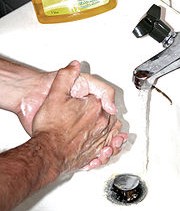Introduction
Hygiene refers to practices that preserve personal and public health. Regular bathing, brushing and flossing the teeth, washing hands, combing hair, cleaning clothes keep a person clean and help prevent the spread of disease. Preventive care of a doctor, dentist, and dental hygienist help maintain good health. Regular exercise, adequate sleep, good nutrition help keep a person fit, feeling good, and stimulate the immune system.
History
 |
Soapmaking first became an established trade in Europe during the so-called "Dark Ages." Bathing continued to be practiced in Europe until shortly after the Renaissance. Modern sanitation as we know it was not widely adopted until the 19th and 20th centuries. According to medieval historian Lynn Thorndike, people in Medieval Europe probably bathed more than people did in the 19th century.
Religion
Various religions made hygiene a moral and spiritual obligation through ritual. Elaborate codes of hygiene can be found in several Hindu texts such as the Manusmriti and the Vishnu Purana.[2] Bathing is one of the five Nitya karmas (daily duties) in Sikhism, not performing which leads to sin according to some scriptures. These codes were based on the notion of ritual purity and were not informed by an understanding of the causes of diseases and their means of transmission. However, some of the ritual-purity codes did improve hygiene.
 |
Clean Living
Campaigns to eliminate health problems or to "clean up" society have occurred in cycles. They included reforms targeted at temperance (anti-alcohol), social purity (sexuality), diet, physical exercise, eugenics (heredity), public health, and anti-tobacco and drug campaigns. Reformers in these movements first attempted to educate the public by convincing individuals they should not drink, smoke or engage in behaviors or lifestyles harmful to health. When this did not work, public policies to prohibit the behaviors were instituted.
During the 1800s, a crusade against “Demon rum” and other spirits ensued in states in the US. During this era a focus on exercise, non-use of tobacco, and the elimination of coffee, tea, sugar, meat and spice from a diet was promoted. New religions that promoted healthy lifestyles such as The Church of Jesus Christ of Latter-Day Saints and Seventh-day Adventists emerged.
Excerpted and adapted from: Hygiene, Cleanliness